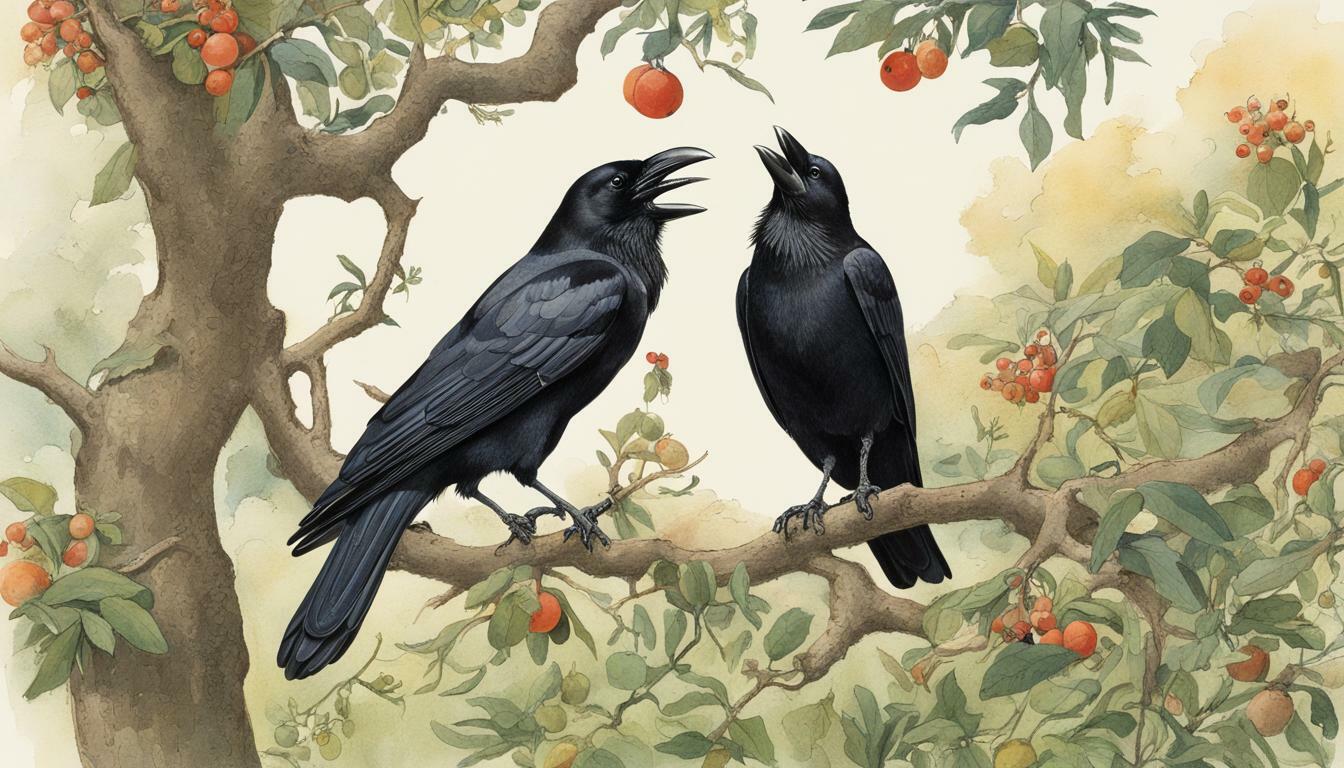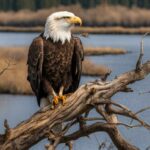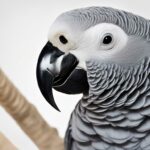As an avian species known for its intelligence and adaptability, crows are fascinating creatures that have been the subject of many studies over the years. One of the questions that often comes up when discussing crows is whether they consume mice. Let’s take a closer look at the dietary habits of crows and explore this topic further.
Crows are known to have a diverse diet that includes both plant and animal matter. They are opportunistic feeders and will consume whatever food source is available to them in their environment. This can range from carrion and other scavenged food to insects, fruits, and small mammals.
When it comes to small mammals, crows have been known to prey on them as part of their feeding habits. This includes mice, as well as other animals such as voles, shrews, and rabbits. Their hunting techniques vary, but can include stalking, ambushing, and scavenging.
Key Takeaways:
- Crows have a diverse diet and are opportunistic feeders
- They have been known to prey on small mammals such as mice as part of their feeding habits
- Their hunting techniques can include stalking, ambushing, and scavenging
Understanding Crow Diet: What Do They Eat?
Crows are known to be omnivorous, meaning they consume both plant and animal-based food. Their varied diet includes fruits, seeds, insects, small mammals, and carrion.
Despite being classified as avian scavengers, crows are not exclusive scavengers. They also have the ability to hunt and capture small animals such as insects, rodents, and amphibians. Crows have been observed using a wide range of hunting techniques, including stalking, ambushing, and scavenging.
In addition to being scavengers, crows also function as important members of the ecosystem by serving as predators. Their predatory role is evident in their hunting of smaller mammals such as mice, voles, and shrews – which they devour whole.
Crows are not generally regarded as a bird of prey in the traditional sense, as they lack some of the physical attributes typically associated with raptors. However, their hunting behavior and ability to capture small mammals aligns with some behaviors that are characteristic of birds of prey.
In conclusion, crows are not simply scavengers, but are also skilled hunters and prominent members of the ecosystem. Their varied diet of fruits, seeds, insects, small mammals, and carrion ensures their ability to adapt to different food sources. Understanding their diverse feeding habits is essential to appreciating the fascinating world of crows and their role in maintaining balance in the ecosystem.
Crow Hunting Behavior: Unveiling the Truth
When it comes to hunting, crows are opportunistic and adaptable birds. While they are typically viewed as scavengers, they are also skilled predators, capable of taking down a variety of prey, including small mammals.
Crows have several hunting techniques at their disposal, depending on the situation. They are known to stalk their prey, waiting for the right moment to strike. They may also ambush unsuspecting prey, using their intelligence and stealth to get the upper hand. In addition, they are skilled scavengers, able to detect and locate carrion from long distances.
Small mammals are a common target for crows, including mice. While not a primary food source, crows will consume mice when the opportunity arises. They have been observed preying on young or weakened mice, as well as scavenging on the remains of mice killed by other predators.
Despite their abilities as predators, crows are often seen as a nuisance by humans due to their scavenging behavior. However, it’s important to remember that crows play an important role in the ecosystem, both as scavengers and as predators. Their presence helps to maintain a balance in the predator-prey relationship and supports the overall health of the environment.
Mouse Consumption by Crows: Fact or Fiction?
You might have heard that crows are fond of consuming mice, and you may be wondering how true this is. While some studies suggest that crows consume small mammals, including mice, it is not a regular part of their diet.
According to observations made by experts on crow feeding habits, they have a diverse diet, consisting of both plant and animal matter. They are omnivores, and their food choice often depends on what is locally available. Crows are scavengers, and they prefer to feed on carrion.
There are misconceptions surrounding crows as strictly carnivorous birds. However, research shows that they are opportunistic feeders, and they thrive on different food sources according to their availability and seasonality.
Despite occasional reports of crows preying on small mammals, including mice, there is no widespread data to support the notion that crows consume mice as a regular part of their diet. The studies that have found evidence of predation by crows on small mammals suggest that it is an opportunistic behavior, and not a staple food source for crows.
While it’s certainly possible that crows will eat mice if they happen to come across one, it’s not a behavior that can be considered typical. In general, crows are not a threat to small mammals and tend to coexist rather than compete with them for food sources.
The Role of Crows in the Ecosystem: A Conclusion
After exploring the diverse feeding habits and hunting behavior of crows, we can appreciate the vital role they play in maintaining the balance of the ecosystem. Crows are opportunistic feeders, consuming a wide range of food sources that include nuts, fruits, insects, and small mammals. Their adaptable diet makes them well-suited to survive in a variety of environments and situations.
While crows are often associated with scavenging and consuming carrion, they also actively hunt small mammals such as mice. Their hunting techniques include stalking, ambushing, and scavenging, demonstrating the intelligence and adaptability of these birds.
Despite their predatory nature, crows also serve as important members of the ecosystem by controlling the populations of small mammals. Their hunting behavior helps to keep the population of these animals in check, preventing overpopulation and maintaining the delicate balance of the ecosystem.
Overall, the relationship between crows and small mammals is complex, with crows both preying on and scavenging from these animals. This intricate predator-prey relationship is just one example of the fascinating world of birds and their role in the ecosystem.
Are Mice Part of the Migration Diet for Crows?
Crows are highly adaptable creatures known for their diverse diet. While they primarily feed on seeds, fruits, and insects, they are opportunistic scavengers and can consume small mammals like mice on occasion. The truth about crow migration, however, does not correlate directly with their dietary habits as their migration patterns are influenced by factors like climate and availability of food sources.
FAQ
Q: Do crows eat mice?
A: Yes, crows do eat mice. While mice are not a staple in a crow’s diet, they are opportunistic eaters and will consume small mammals when given the chance.
Q: What do crows eat?
A: Crows have a varied diet that consists of both plant and animal matter. They are known to scavenge for carrion, consume fruits, nuts, grains, insects, small reptiles, amphibians, and yes, even small mammals like mice.
Q: What is the hunting behavior of crows?
A: Crows exhibit various hunting behaviors, including stalking, ambushing, and scavenging. They are intelligent birds and have been observed using tools to access food. They are opportunistic hunters and will target a wide range of prey depending on their availability, including small mammals like mice.
Q: Do crows actively seek out mice as part of their diet?
A: While crows will eat mice when they come across them, they do not actively seek them out as a primary food source. Crows have a diverse diet and will consume a wide range of food items, depending on their environment and availability.
Q: What is the role of crows in the ecosystem?
A: Crows play a vital role in the ecosystem as scavengers and predators. They help maintain the balance by consuming carrion and controlling populations of small mammals, including mice. Their feeding habits contribute to the overall health of an ecosystem.











